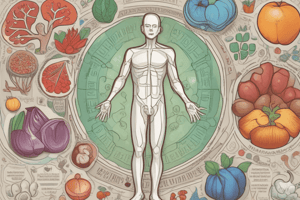Podcast
Questions and Answers
What is the primary function of macronutrients?
What is the primary function of macronutrients?
- To provide energy and support growth (correct)
- To support nerve function
- To regulate various bodily functions
- To maintain healthy tissues
Which of the following is NOT a micronutrient?
Which of the following is NOT a micronutrient?
- Protein (correct)
- Calcium
- Vitamin C
- Vitamin K
What is the role of proteins in the body?
What is the role of proteins in the body?
- To regulate metabolic processes
- To maintain healthy skin
- To support growth and development (correct)
- To provide energy for the body
What is the consequence of inadequate nutrient intake?
What is the consequence of inadequate nutrient intake?
Which of the following is a function of carbohydrates?
Which of the following is a function of carbohydrates?
What is the role of vitamins and minerals in the body?
What is the role of vitamins and minerals in the body?
What are the three main categories of macronutrients?
What are the three main categories of macronutrients?
Flashcards are hidden until you start studying
Study Notes
What are Nutrients?
Nutrients are substances that provide energy and support growth, maintenance, and repair of living organisms.
Types of Nutrients
There are two main categories of nutrients:
Macronutrients
- Provide energy and support growth
- Include:
- Carbohydrates (e.g., sugars, starches, fiber)
- Proteins (e.g., amino acids)
- Fats (e.g., triglycerides)
Micronutrients
- Essential for various bodily functions
- Include:
- Vitamins (e.g., A, C, D, E, K)
- Minerals (e.g., calcium, iron, potassium, zinc)
Functions of Nutrients
Energy Production
- Carbohydrates, proteins, and fats provide energy for the body
Growth and Development
- Proteins and essential amino acids support growth and development
Regulation of Metabolic Processes
- Vitamins and minerals regulate various metabolic processes (e.g., energy production, nerve function)
Maintenance of Healthy Tissues
- Vitamins and minerals help maintain healthy tissues (e.g., skin, hair, eyes)
Importance of Nutrients
- Adequate nutrient intake is essential for maintaining optimal health and preventing deficiencies and diseases.
What are Nutrients?
- Nutrients are substances that provide energy and support growth, maintenance, and repair of living organisms.
Types of Nutrients
- There are two main categories of nutrients: macronutrients and micronutrients.
Macronutrients
- Provide energy and support growth.
- Include carbohydrates, proteins, and fats.
- Examples of carbohydrates: sugars, starches, fiber.
- Examples of proteins: amino acids.
- Examples of fats: triglycerides.
Micronutrients
- Essential for various bodily functions.
- Include vitamins and minerals.
- Examples of vitamins: A, C, D, E, K.
- Examples of minerals: calcium, iron, potassium, zinc.
Functions of Nutrients
Energy Production
- Carbohydrates, proteins, and fats provide energy for the body.
Growth and Development
- Proteins and essential amino acids support growth and development.
Regulation of Metabolic Processes
- Vitamins and minerals regulate various metabolic processes.
- Examples of regulated processes: energy production, nerve function.
Maintenance of Healthy Tissues
- Vitamins and minerals help maintain healthy tissues.
- Examples of healthy tissues: skin, hair, eyes.
Importance of Nutrients
- Adequate nutrient intake is essential for maintaining optimal health.
- Preventing deficiencies and diseases requires adequate nutrient intake.
Studying That Suits You
Use AI to generate personalized quizzes and flashcards to suit your learning preferences.




